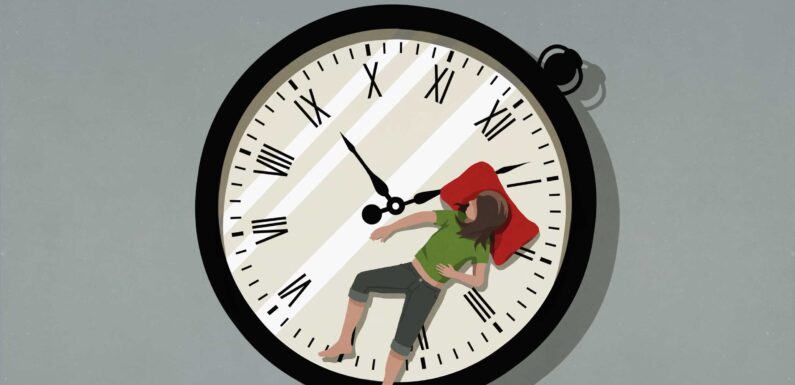
ARE you feeling cranky, extra stressed and desperate for a nap?
You could be suffering from "winter period fatigue", experts say.
Menstrual tiredness is common throughout the year, primarily due to heavy bleeding, high oestrogen levels or lack of sleep.
Almost half of all women experience it to some degree, research shows.
But the energy slump can get particularly bad during winter, specialists warn.
They blame a lack of sunlight, increased stress, changes in eating habits, less physical activity and seasonal affective disorder (SAD) – a type of depression that has a seasonal pattern and tends to be more severe in the colder months.
READ MORE ON WELLBEING

From 'sugarface' to silent killer – 9 things your skin says about your health

The 9 lifestyle tips longest living people swear by to protect heart health
Here, pregnancy advisor Avril Flynn delves into exactly why winter can exacerbate symptoms and make you feel ropey – and most importantly, how to combat it.
What is period fatigue?
"As your menstrual cycle progresses, you might notice fluctuations in your energy levels, with fatigue being one of the most common symptoms," Avril said.
"The monthly hormonal shifts, as well as physiological responses within women’s bodies, can lead to heightened feelings of tiredness during specific phases.
"If you find yourself lacking in energy, feeling tired, or generally listless in the days leading up to and during your period, you might be experiencing what's commonly referred to as period fatigue."
Most read in Health

The sign of oesophageal cancer you might spot in your poo – and 9 other symptoms

How to have the best sex of your life in just 15 minutes

I was having sex when I suffered a stroke – my date thought I was on drugs

I’m sharing clip of rolling baby on changing mat as a warning to parents
There is some debate about exactly what causes it, but fluctuating oestrogen and serotonin levels, low iron caused by heavy bleeding, blood glucose spikes and drops triggered by food cravings and disturbed sleep are all potential factors.
A study by ActiveIron found 49 per cent of women experience some form of period fatigue.
Avril said the most common symptoms are:
- Consistently low energy levels
- Finding yourself sleeping longer than usual
- An increased urge to nap during the day
- Persistent feelings of tiredness and listlessness
Why does it get so bad during winter?
With colder weather starting to creep in, it is common to experience period fatigue more than any other time of year, according to Avril.
She said the six primary causes are:
1. Reduced physical activity
When the days get shorter and it's dark when you wake up and get home from work, it can be hard to find the motivation to exercise.
Avril said this, made worse by Halloween, Bonfire Night and Christmas parties, can have a huge impact on our wellbeing.
"Since physical activity improves circulation and releases endorphins, it can help reduce fatigue," she added.
"When physical activity decreases, the symptoms of period fatigue are increased."
2. Seasonal affective disorder
Another major factor is SAD, which can lead to increased feelings of fatigue and lethargy, Avril said.
"SAD is associated with reduced exposure to natural sunlight, which can disrupt circadian rhythms and affect mood," she added.
"This can increase the fatigue experienced during menstruation."
4. Natural light exposure
This lack of sunlight thanks to fewer daylight hours messes with our sleeping patterns and internal body clock, according to Avril.
We might struggle to get to sleep, wake up throughout the night, or find it almost impossible to rise in the morning.
"This change can lead to poor sleep quality, and an increased feeling of fatigue," she said.
3. Eating habits
Many people seek comfort during colder weather, often turning to food.
But what we eat can dramatically boost or slash our energy levels – particularly during certain times of the month, Avril said.
The expert added: "People may crave more comfort foods, which can be high in sugar and carbohydrates.
"These dietary choices can cause fluctuations in blood sugar levels, leading to energy crashes and increased feelings of fatigue."
5. Increased stress
Whether it's worrying about the cost of heating your home, finding a Halloween costume or fretting over where to spend Christmas, it is no secret that winter can be stressful.
But this stress can amplify period symptoms, including fatigue, making it more difficult to manage, Avril said.
6. Dehydration
Most people make an effort to drink plenty of water throughout the summer.
But it is still vital to take in enough fluid during the colder months too.
"People may not feel as thirsty and might not drink enough water, but dehydration can lead to feelings of tiredness and, in turn, increase period fatigue," Avril said.
How to combat it
If you find yourself struggling with period fatigue, particularly during winter, there are thankfully some relatively simple solutions.
Read More on The Sun

Bargain supermarket is selling Christmas dinner for just £4 a head

Where Big Brother 7 cast are now – from shock death to footballer scandal
Avril recommends:
- Making self-care a priority (e.g. meditation or reading)
- Maintaining a balanced diet
- Staying hydrated (experts recommend six to eight glasses a day)
- Incorporating gentle exercise into your routine (e.g. yoga or Pilates)
- Managing stress with relaxation techniques (e.g. deep breathing or massage)
- Getting enough exposure to natural light, especially in the morning
Source: Read Full Article
